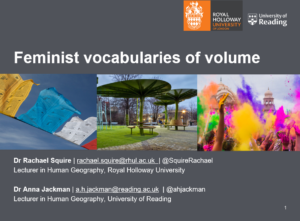It was wonderful to participate at the annual Royal Geographical Society (RGS) conference at Newcastle University (30 Aug – 2 Sep 2022). The conference was a space for geographers to come together both in person and online to share and chat about research, and catch up with colleagues and friends.
Vocabularies of volume:
Along with the brilliant Dr Rachael Squire (Royal Holloway) and Dr Chris Lizotte (Oxford Brookes), we hosted two sessions on the theme of ‘Vocabularies of volume‘. The aim of the sessions was to explore and extend existing geographical work on the concept of volume. As we wrote in our session abstract, ‘while territory has long been narrated as two-dimensional, geographers, alongside social scientists more widely, are increasingly expanding and deepening their thinking about territory in order to take into account its volume and three-dimensionality. After all, territory is not simply an extent of calculable terrain on the Earth’s surface, but rather includes the multiple vertical and depthful dimensions of the subterranean (Elden, 2013) and undersea (Squire, 2016), and the aerial and atmospheric (Lin, 2018). As geographers continue to explore territory’s dimensionalities, there remains a need to understand how the relations that make up these dimensions are narrated in particular terms (Benwell, 2020; Jackman & Squire, 2021; Peters & Turner, 2018). That is, what kinds of vocabularies are drawn upon to describe, evoke, access, recount and otherwise communicate territorial volumes? And which actors are foregrounded, represented, and attended to therein? This question builds upon scholarship that has at once raised questions of how dominant framings of (nation-state) territoriality silence experiences of terrain constructed as marginal (e.g. Mountz et al., 2013; Coddington, 2018; Jackman et al., 2020), and how those marginalized understandings can be retrieved, reasserted (e.g. Sundberg & Kaserman, 2007; Colls, 2012; Srinivasan, 2016), and diversified through attention to, for example, the spiritual (Theriault, 2017), ecological and affective (Krmpotich et al., 2010). This session is thus interested in revisiting, critiquing and widening existing vocabularies of volume, to explore, account for and attend to, the diverse actors in and experiences of volumetric worlds.’

It was such a pleasure to hear from excellent presenters and to chair engaging discussions across shared interests and themes. You can find out more in the twitter thread below, which introduces the speakers and outlines the scope of their presentations. I thoroughly enjoyed presenting (with Dr Rachael Squire) on our work on ‘feminist vocabularies of volume’. Thank you again to all who participated and joined us in person and online!
Such brilliant presentations & discussions across our ‘vocabularies of volume’ #RGS2022 sessions this afternoon. We heard such varied & exciting reflections, a summary thread below 🧵. (/1)
— Dr. Anna Jackman (@ahjackman) September 2, 2022
Urban intelligences:
In addition to co-hosting our sessions (above), I was also fortunate enough to be part of a fascinating panel discussion for one of the ‘Urban intelligences in complex times: AI, robots and autonomous systems coping with disruption, risk and uncertainty in the city‘ sessions. Hosted by Dr Miguel Valdez (Open University) and Dr Federico Cugurullo (Trinity College Dublin), the sessions were interested in how ‘artificial intelligence (AI) is transforming cities in unprecedented ways’.
Thoroughly enjoyed the rich sessions today on 'Urban Intelligences in complex times: AI, robots and autonomous systems coping with disruption, risk and uncertainty in the city'. Organised by Miguel Valdez & Federico Cugurullo, the sessions explored the multiple ways AI is (1/2)
— Dr. Anna Jackman (@ahjackman) September 1, 2022
